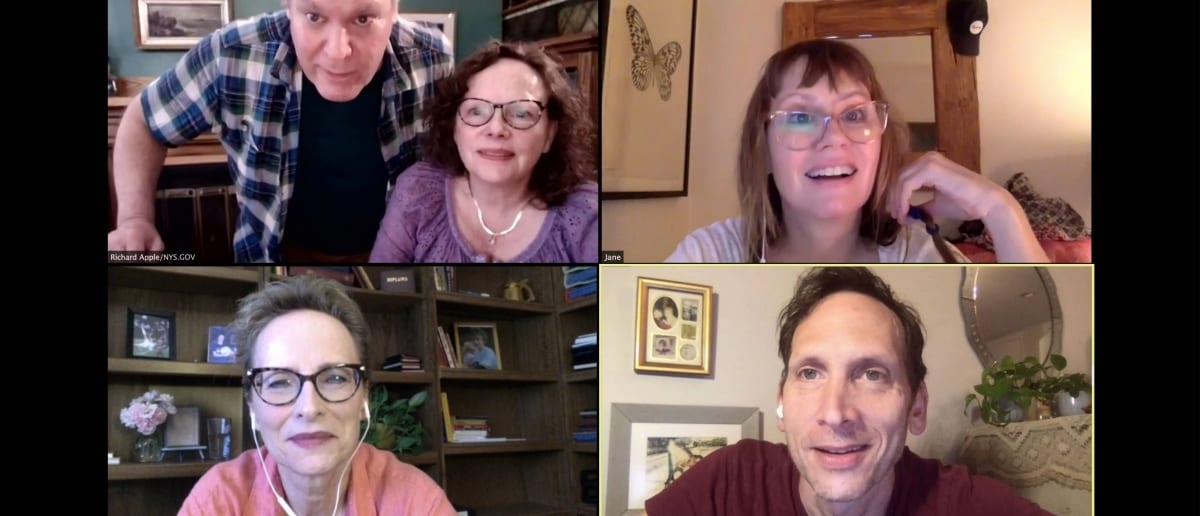“What can you say to these kids right now?” the teacher Barbara Apple (Maryann Plunkett) asks her family, grasping for the right words to deliver in a video for her students. “It all seems so obvious when you say it, so necessary.” She of course means the adages, the fears, the affirmations tossed about in the face of the pandemic and protests together shaking the country. Though we don’t know which ones Barbara settles on, we nonetheless hear many in And So We Come Forth, the sixth iteration of Richard Nelson’s Apple Family Plays and the second to take place via Zoom call, following up April’s What Do We Need to Talk About?: Conversations on Zoom. Talk About marked the unprecedented return of the Apples to theatre for the first time since the Public Theater premiered the first four plays between 2010 and 2013.
This is admittedly my first experience with an Apple play, but I understand this one has a setup akin to the previous five: siblings Barbara, Richard (Jay O. Sanders), Marian (Laila Robins), Jane (Sally Murphy) and Jane’s boyfriend Tim (Stephen Kunken) gather at table (now, tables) in Rhinebeck, N.Y. and chat about life amid a major political event over dinner. Today’s menu is Indian food and, for Jane, cereal, – for which Jane is teased (as family is wont to do) for her refusal to let her siblings bring her takeout due to extra virus-prompted caution. Today’s conversation topic, as I previously alluded to, is unrest.
We do have to sit through about 15 minutes of kibitzing before arriving at the first major tension: Tim proposes bringing his daughter and her friend to live with him and Jane, citing presumably lockdown-related tension building in the women’s Brooklyn home, where he is visiting. It’s one of two plot points that can loosely be called a “through line” (the play is a family chat, after all, interrupting and getting off-topic and finding the roundabout way back to it again is what solidifies the realism of it) — that and Barbara’s efforts to connect with her students. Or anyone, really, besides Richard, with whom she is living. She spends as much time talking with (and over) him as she does reading aloud her correspondences with friends near and far, hoping to find worthwhile words to pass along somewhere in them. Yet between all the words recited from printed emails, exchanged among family, “lonely” is never one of them, and it’s simply made clear in the pained look in all their eyes as they talk, in the way Jane lingers on the call just a little longer, in the way Barbara melts into the notes of an opera song played on her phone. The one exception is Marian, who gets the least words but uses them to make her solace clear: “I have not touched another human being in three months … This is what I’m missing.”
Loneliness and uncertainty are to be par for the course in any coronavirus era-set play, at the risk of becoming trite. So perhaps that’s why I found myself most invested in the faraway characters, the ones present only in emailed words and anecdotes, who represent a different kind of loneliness. We learn that Maggie, the friend of Tim’s daughter Karen, is living with her because of an incident with abusive parents. The move to Rhinebeck would uproot both her and Karen from their one shred of normalcy, even as they can find solace in each other as a friend. But it’s made to feel as if there’s no other way.
The issues of race and protests are brought up briefly but quickly dropped; though the play is described as having the family grapple with the current state of the world, And So We Come Forth is mainly an escape from that particular turmoil. But Barbara does read, as part of an email from a friend, some questions the friend and her husband asked each other. They weren’t supposed to be answered. They’re not supposed to be answered in the span of the play. But perhaps they’re an invitation to take the play with you a little longer, keep the Apples in mind a little longer, and grapple with them on your own. Or at least in mind, together.
“What kind of country should we have? What kind do we have? What kind can we expect it to become?”
Nebulous, yes, as most of the play’s allusions to the world around the characters are. But good fodder, perhaps, for another family dinner conversation.

